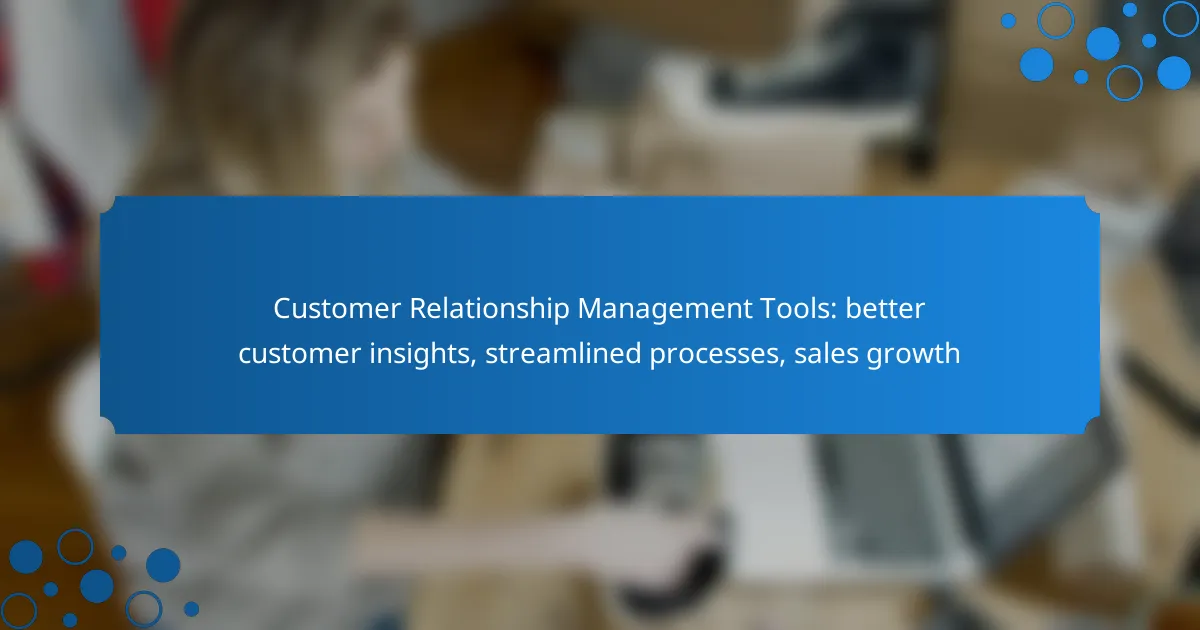Customer Relationship Management (CRM) tools are essential for gaining deeper customer insights, optimizing business processes, and fostering sales growth. By automating tasks and centralizing information, these platforms enable teams to focus on building meaningful relationships with customers. With features like contact management and analytics, effective CRM solutions empower businesses to enhance their customer relationship strategies.
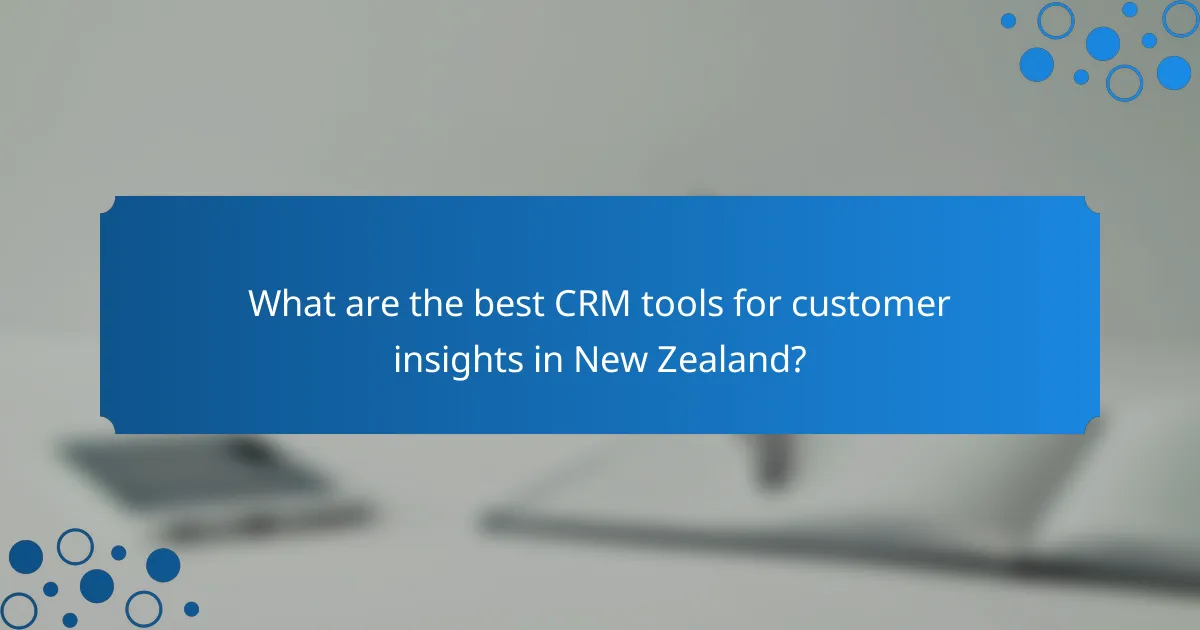
What are the best CRM tools for customer insights in New Zealand?
The best CRM tools for customer insights in New Zealand include Salesforce, HubSpot, Zoho, Microsoft Dynamics 365, and Pipedrive. These platforms offer features that enhance customer understanding, streamline processes, and ultimately drive sales growth.
Salesforce CRM
Salesforce CRM is a leading platform known for its robust analytics and reporting capabilities. It allows businesses in New Zealand to gather detailed customer insights through customizable dashboards and real-time data tracking.
Consider its extensive integration options with other tools, which can enhance your existing workflows. However, the complexity of its features may require a steeper learning curve for new users.
HubSpot CRM
HubSpot CRM is user-friendly and offers a free tier, making it accessible for small to medium-sized businesses in New Zealand. It provides essential tools for tracking customer interactions and automating marketing efforts.
With its intuitive interface, users can quickly generate reports and insights. However, advanced features may require upgrading to paid plans, which can become costly as your needs grow.
Zoho CRM
Zoho CRM is a cost-effective solution that offers a wide range of features tailored for customer insights. It includes tools for sales automation, analytics, and customer engagement, making it suitable for various business sizes in New Zealand.
The platform’s flexibility allows for customization to fit specific business needs, but some users may find the interface less polished compared to competitors. Regular updates help improve functionality and user experience.
Microsoft Dynamics 365
Microsoft Dynamics 365 combines CRM and ERP capabilities, providing comprehensive customer insights and business management tools. This integration is beneficial for larger organizations in New Zealand looking for an all-in-one solution.
Its powerful analytics tools help businesses make data-driven decisions. However, the pricing structure can be complex, and the system may require significant resources for implementation and training.
Pipedrive
Pipedrive is designed with sales teams in mind, focusing on pipeline management and customer relationship tracking. Its visual interface helps users in New Zealand manage leads and sales processes effectively.
The platform offers useful insights through sales reporting and forecasting tools. While it excels in simplicity, it may lack some advanced features found in more comprehensive CRMs, making it best suited for smaller teams or businesses focused primarily on sales.
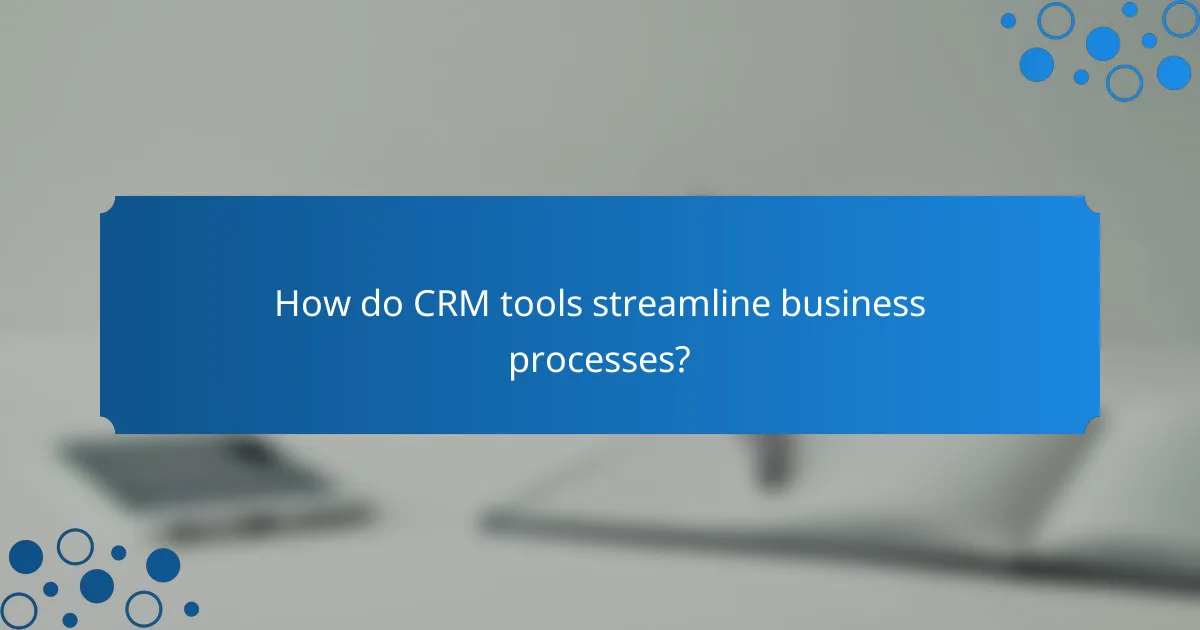
How do CRM tools streamline business processes?
CRM tools streamline business processes by automating tasks, centralizing customer information, and enhancing communication. This leads to increased efficiency and allows teams to focus on building relationships rather than managing data.
Automation of repetitive tasks
CRM systems automate repetitive tasks such as data entry, follow-up emails, and appointment scheduling. This reduces the time employees spend on mundane activities, allowing them to concentrate on higher-value tasks like customer engagement and strategy development.
For example, a CRM can automatically send reminders for follow-ups or schedule meetings based on customer availability. This not only saves time but also minimizes the risk of human error.
Centralized customer data management
Centralized customer data management ensures that all customer interactions and information are stored in one accessible location. This enables teams to quickly retrieve and update customer profiles, leading to more informed decision-making.
With a unified database, sales and support teams can view complete customer histories, preferences, and previous interactions. This holistic view helps in personalizing communication and improving customer satisfaction.
Improved communication channels
CRM tools enhance communication channels by integrating various platforms such as email, chat, and social media. This allows businesses to engage with customers through their preferred channels, ensuring timely and relevant interactions.
For instance, a CRM can track customer inquiries from multiple sources and route them to the appropriate team member. This streamlined approach reduces response times and fosters a more cohesive customer experience.
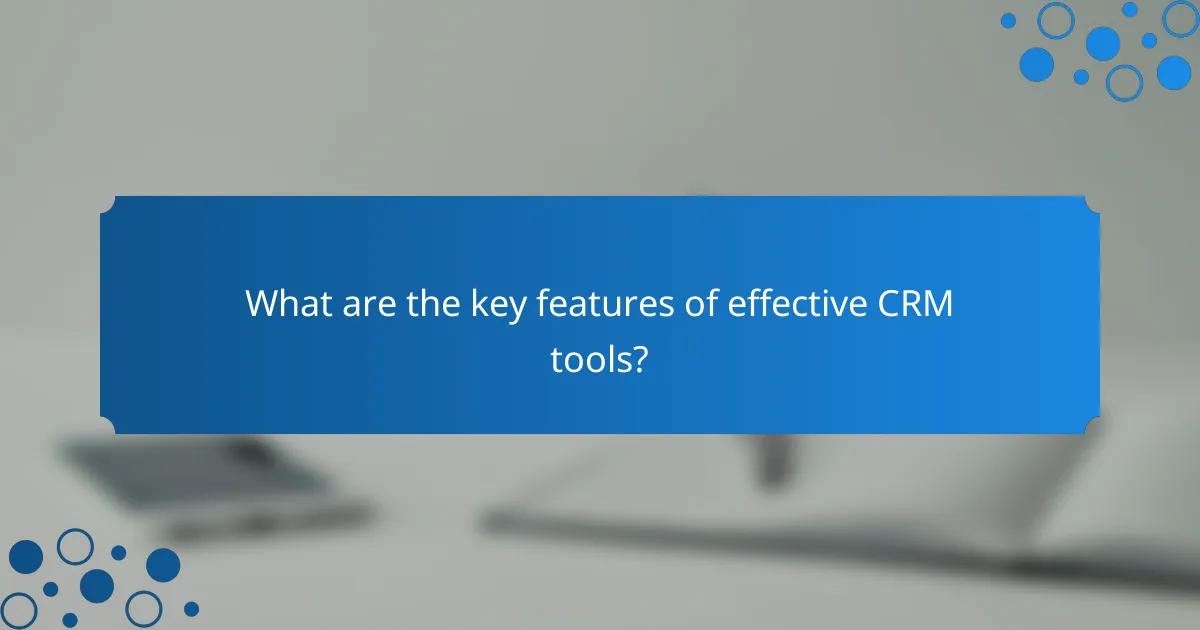
What are the key features of effective CRM tools?
Effective CRM tools provide essential features that enhance customer insights, streamline processes, and drive sales growth. Key functionalities include contact management, sales pipeline tracking, reporting and analytics, and integration capabilities, all of which contribute to a more organized and efficient customer relationship strategy.
Contact management
Contact management is a fundamental feature of CRM tools that allows businesses to store and organize customer information efficiently. This includes details such as names, contact numbers, email addresses, and interaction history, which are crucial for personalized communication.
Effective contact management systems often enable segmentation of contacts based on various criteria, such as demographics or purchasing behavior. This helps businesses tailor their marketing efforts and improve customer engagement.
Sales pipeline tracking
Sales pipeline tracking helps businesses visualize and manage their sales processes from lead generation to closing deals. CRM tools provide a structured view of each stage in the sales pipeline, allowing sales teams to monitor progress and identify bottlenecks.
By using sales pipeline tracking, companies can forecast revenue more accurately and allocate resources effectively. It is beneficial to regularly review and update the pipeline to ensure that leads are nurtured appropriately and opportunities are not missed.
Reporting and analytics
Reporting and analytics features in CRM tools provide insights into customer behavior, sales performance, and overall business health. These tools generate reports that help identify trends, measure success, and inform strategic decisions.
Utilizing reporting capabilities allows businesses to track key performance indicators (KPIs) such as conversion rates and customer retention. Regular analysis of these metrics can lead to actionable improvements in sales strategies and customer service approaches.
Integration capabilities
Integration capabilities enable CRM tools to connect with other software applications, such as email marketing platforms, accounting systems, and e-commerce solutions. This interoperability streamlines workflows and ensures that data is consistent across all systems.
When selecting a CRM tool, consider its ability to integrate with existing tools your business uses. Effective integration can enhance productivity by reducing manual data entry and improving data accuracy, ultimately leading to better customer insights and service.
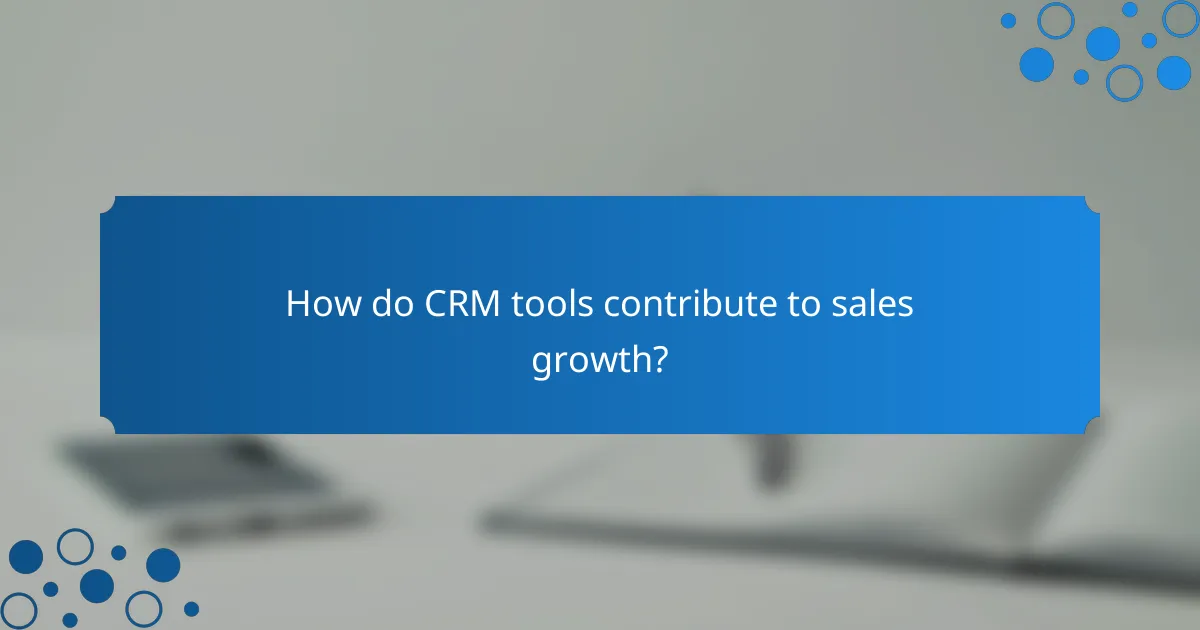
How do CRM tools contribute to sales growth?
CRM tools significantly enhance sales growth by providing better customer insights, streamlining processes, and fostering stronger relationships. These systems enable businesses to manage customer interactions efficiently, leading to increased sales opportunities and improved customer retention.
Enhanced lead management
Effective lead management is crucial for converting prospects into customers. CRM tools allow businesses to track leads throughout the sales funnel, from initial contact to final sale. By categorizing leads based on their behavior and engagement, sales teams can prioritize follow-ups and tailor their approach to maximize conversion rates.
For instance, a CRM can automatically score leads based on their interactions with your website or marketing materials, helping sales representatives focus on the most promising opportunities. This targeted approach can lead to higher sales efficiency and better resource allocation.
Personalized customer interactions
Personalization is key to building lasting customer relationships. CRM systems store detailed customer data, enabling businesses to tailor their communications and offers to individual preferences and behaviors. This level of personalization can significantly enhance customer satisfaction and loyalty.
For example, a CRM can help a company send personalized email campaigns based on past purchases or browsing history, increasing the likelihood of repeat sales. By understanding customer needs and preferences, businesses can create more meaningful interactions that drive sales growth.
Data-driven decision making
Data-driven decision making is essential for optimizing sales strategies. CRM tools provide valuable insights through analytics and reporting features, allowing businesses to assess performance and identify trends. This information helps in making informed decisions that can lead to improved sales outcomes.
For instance, a company can analyze sales data to determine which products are performing well and which are not, enabling them to adjust their marketing strategies accordingly. By leveraging data, businesses can refine their approaches and focus on the most effective tactics to drive sales growth.
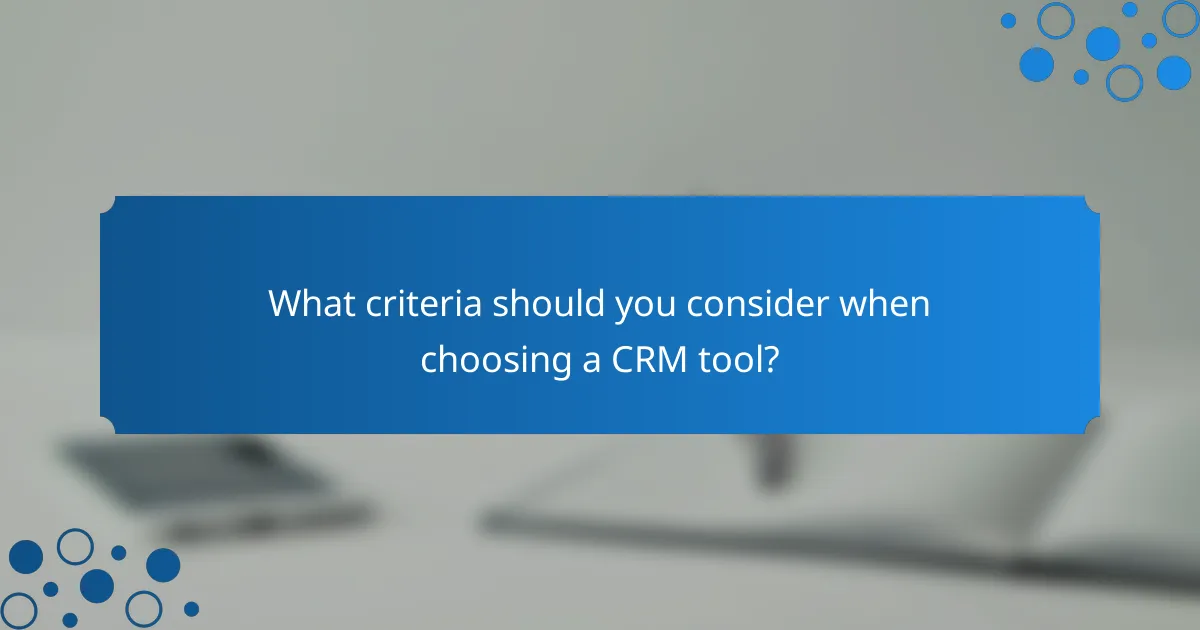
What criteria should you consider when choosing a CRM tool?
When selecting a Customer Relationship Management (CRM) tool, consider factors such as usability, integration capabilities, scalability, and cost. These criteria will help ensure that the CRM aligns with your business needs and enhances customer insights, streamlines processes, and supports sales growth.
Usability
Usability is crucial when choosing a CRM tool, as it directly affects user adoption and efficiency. A user-friendly interface allows team members to navigate the system easily, reducing the learning curve and minimizing errors. Look for tools that offer intuitive dashboards and customizable features to suit your team’s workflow.
Integration capabilities
Integration capabilities determine how well the CRM can connect with other systems you use, such as email marketing platforms, accounting software, or e-commerce solutions. A CRM that integrates seamlessly with your existing tools can enhance data sharing and improve overall efficiency. Verify that the CRM supports APIs or pre-built integrations with popular applications.
Scalability
Scalability is essential for accommodating business growth. Choose a CRM that can adapt to increasing data volumes and user numbers without sacrificing performance. Consider whether the tool offers tiered pricing plans or additional features that can be unlocked as your business expands.
Cost
Cost is a significant factor in CRM selection, as it can vary widely based on features and user counts. Evaluate your budget and consider both upfront costs and ongoing expenses, such as subscription fees or maintenance charges. Look for CRM solutions that provide a good balance of features and affordability, ensuring you get value for your investment.
